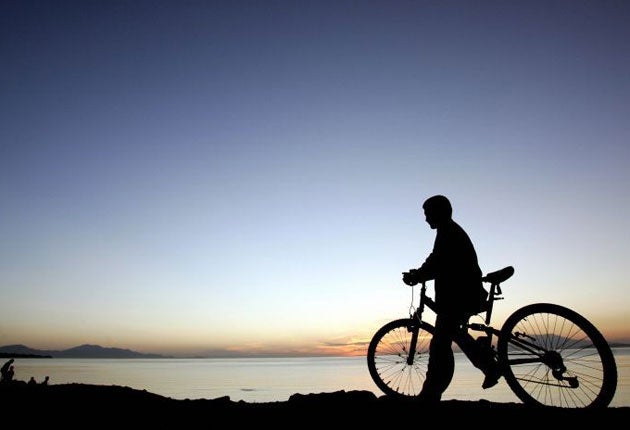Holidays: the appeal of silence
Weekend breaks at monastaries are booming and even Delia Smith is following the trend for meditation – it seems we all want to escape the chatter of modern life. Peter Stanford sounds out the appeal

Your support helps us to tell the story
From reproductive rights to climate change to Big Tech, The Independent is on the ground when the story is developing. Whether it's investigating the financials of Elon Musk's pro-Trump PAC or producing our latest documentary, 'The A Word', which shines a light on the American women fighting for reproductive rights, we know how important it is to parse out the facts from the messaging.
At such a critical moment in US history, we need reporters on the ground. Your donation allows us to keep sending journalists to speak to both sides of the story.
The Independent is trusted by Americans across the entire political spectrum. And unlike many other quality news outlets, we choose not to lock Americans out of our reporting and analysis with paywalls. We believe quality journalism should be available to everyone, paid for by those who can afford it.
Your support makes all the difference.God and mammon have never mixed. Times of material plenty usually see the soul sidelined in favour of spend, spend, spend. Then when the economic going gets tough, the belief that a burgeoning bank account is the meaning of life begins to look threadbare, and the search for an alternative meaning that doesn't come with a conventional price tag resurfaces. So as we plunge daily into recession, spirituality is suddenly on the up. One form in particular is all the rage – the search for silence.
Monasteries and convents are reporting a surge in enquiries for their "tester" long weekends, where spiritually-hungry visitors can sample a life of silence. Secular retreat centres are also booming. And on the internet, would-be hermits can now book solitude by the week. There is a queue of well-known individuals extolling the virtues of silence as a cure for current uncertainties. Some are to be expected. Rowan Williams, the monk-like Archbishop of Canterbury, was on Radio 3 at the weekend describing "the realm of silence" as a "crucial part of the daily discipline". More surprising was the revelation that the television chef Delia Smith spends an hour a day in silence seeking "union with God", and wants us to follow her example.
So what exactly is the appeal of a life of silence for the credit-crunched? I recently visited St Hugh's Charterhouse in rural West Sussex, an enclosed monastery of Catholic Carthusians, to find out. After many years of declining vocations, numbers have of late taken an upward turn, along with expressions of interest on the monks' website. They live in individual hermitages – each boasting four rooms and private garden – gathered round what is believed to be the largest cloister in the world (they use bikes to get round it). They emerge only to go to chapel, where they address God (not each other) in Gregorian chant. Otherwise, there is only one hour on a Sunday and a countryside walk on a Monday at which they can speak.
"Silence is tremendously important in the sense that it creates a complete atmosphere that protects a certain type of interiority," explained Father Cyril, the novice master in charge of new recruits. "Silence is not an absence of something. It's a sort of presence. Not talking does allow people to live more deeply, to try to find themselves at a deeper level than the emotional, pretty egocentric trivial level. When that's taken away, bit by bit the person discovers who he really is."
Many struggling to keep afloat in the recession may feel that the rigours of the Carthusian lifestyle are a bit beyond them, however eager they are for spiritual food. The existence of the hermit solitary, living in the world but also apart from it, might have more appeal – especially when, like the Canadian Anglican priest Cynthia Bourgeault (pictured above left), you only do it part-time.
When not in her hermitage off the coast of Maine, Dr Bourgeault gives lectures on the benefits of "silence in the city". Her recent talk in London was full to bursting. "It gives me great hope that people are beginning to see that something is missing," she told me. "Silence is our first human language. Solitude should be in everyone's life – not as a permanent exterior condition, but as an internalised monastery. Then we can live in the world with calm harmony."
Both Dr Bourgeault and Father Cyril see silence as peeling back the layers of an onion to reveal the divine. There are, though, more secular types of silence on offer. At the Self-Realisation Centre, based in a 17th-century manor house in Somerset, popular weekend silent retreats are simply an opportunity, says the manager, Christine Kesley, "to stop and listen to what's going on inside, to listen for the wisdom inside. When we're busying ourselves externally, we don't always see that inside us there is something special and unique. If we listen to ourselves in the silence, then we will know what we need in life."
What all these varieties of silence have in common, though, is that they are satisfying that huge appetite for change that has grown out of the present economic crisis. The claims being made for silence appeal precisely because they stand in direct contradiction to everything the world – until very recently – prized. As Father Cyril puts it: "This is not a commodity you're going to be able to sell on the high street, but this is the reality of who we are."
Peter Stanford's documentary, 'The Spirit of Silence', will be broadcast on Heart and Soul on the BBC World Service on 7 March
Join our commenting forum
Join thought-provoking conversations, follow other Independent readers and see their replies
Comments